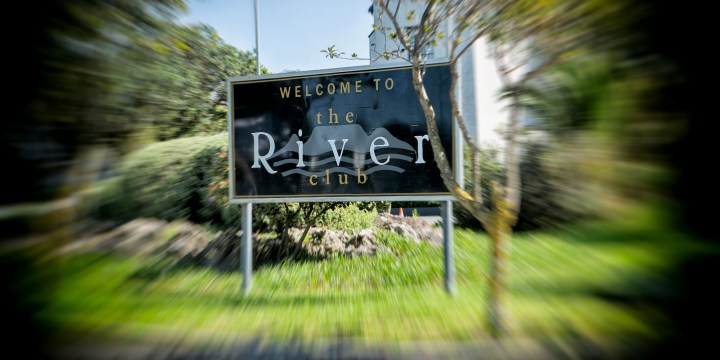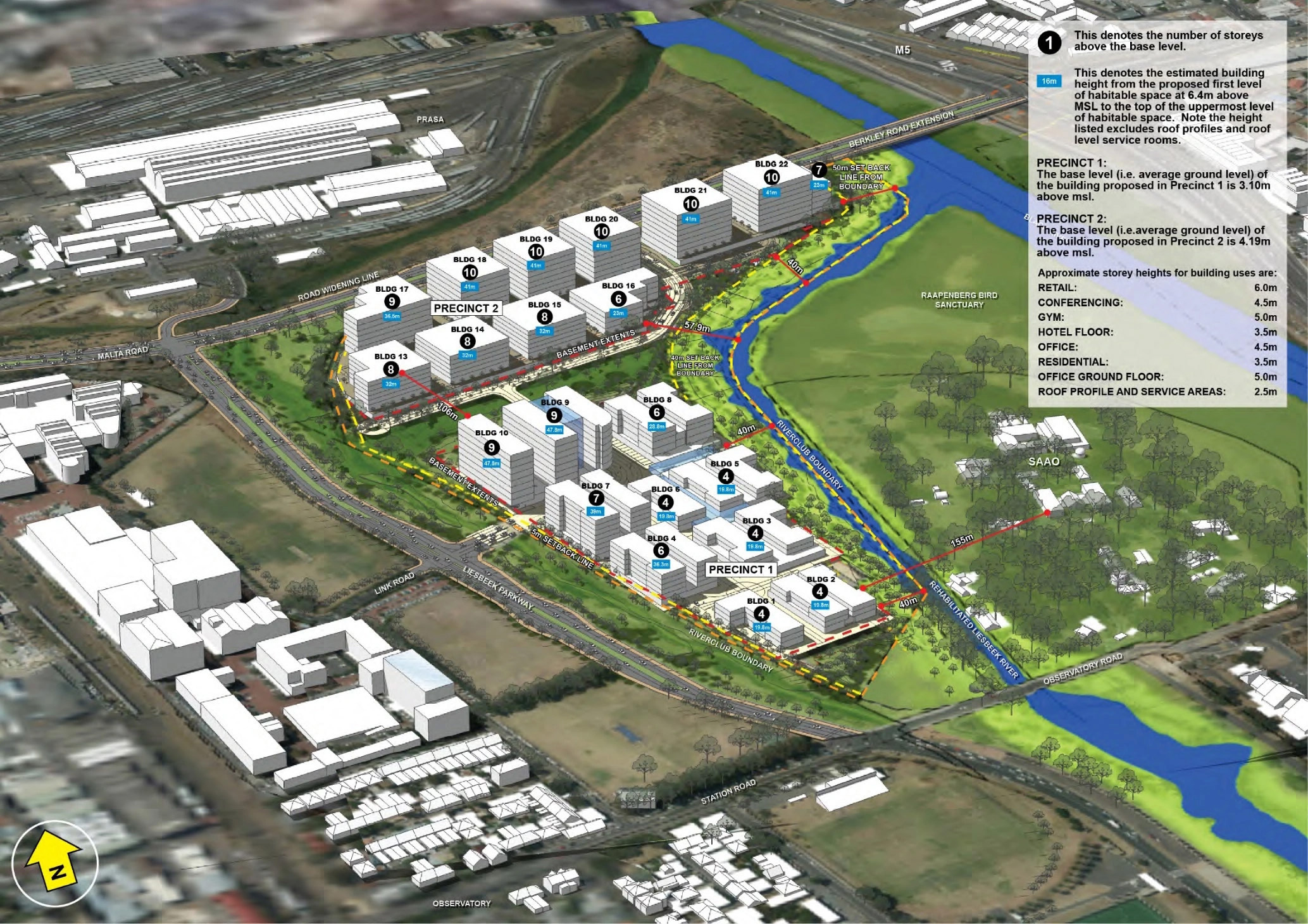GroundUp
Court stops R4.5-billion River Club development, including new Amazon headquarters

Judge Patricia Goliath says that there has not been meaningful engagement by the developers.
The R4.5-billion development at the River Club site in Observatory has been stopped, with a court ruling that the developers must “consult meaningfully” with all affected people.
The interim interdict granted by Western Cape deputy judge president Patricia Goliath, will remain in place pending a review of the relevant environmental land use authorisations for the development on the historically and culturally significant floodplain.

This is the planned development at the River Club. It is on hold for now. (Photo: Supplied)
In her ruling, Judge Goliath said the fundamental right to culture and heritage of indigenous groups, particularly the Khoi and San First Nations People, was under threat because they had not been properly consulted.
“The order of this court must not be construed as a criticism against the development … The core consideration is the issue of proper and meaningful consultation with all affected First Nations Peoples,” she said.
“The fact that the development has substantial economic, infrastructural and public benefits can never override the fundamental rights of First Nation Peoples.”
The development of a “large-scale urban campus”, on the site where the Liesbeek and Black Rivers join, began last year. It includes the regional headquarters for Amazon.
The Observatory Civic Association (OCA) and Goringhaicona Khoi Khoin Indigenous Traditional Council (GKKITC ) approached the court for the interdict, citing the trustees of the Liesbeek Leisure Properties Trust, provincial and local government and the Western Cape First Nations Collective as respondents.
The site, which was bought by the trust for R12-million, forms part of a broader area known as Two Rivers Urban Park (TRUP), that was the dominion of the Gorinhaiqua and, according to the applicants, is the only undeveloped remnant of the grazing lands used in the summer by the Khoekhoe for their cattle.
The applicants said the sites hosted “significant ceremonies and gatherings” and are “holders of memory”.
A provincial government commissioned heritage study concluded that the entire TRUP area had historic and symbolic value.
Judge Goliath, in her ruling, said any development of the site necessitated consultation with the First Nations Group and, to this end, the provincial department of public works had appointed Rudewaan Arendse of AFMAS Solutions to consult with the First Nations Groups and to prepare a report on a local spatial development framework for TRUP.
However, there were divisions within that grouping. A group in favour of the development was established under the umbrella of the First Nations Collective and the GKKITC terminated its engagement with Arendse during the consultation process.
There were further consultations directed by Heritage Western Cape which led to a report and multiple phases of public comments, which were overwhelmingly negative.
Environmental authorisation, which Heritage Western Cape objected to, was issued in August 2020.
Development commenced in July 2021.
In his affidavit before the court, GKKITC commissioner Tauriq Jenkins confirmed he had been interviewed by Arendse but said after the First Nations Collective was formed to support the development, those opposed were “vilified and abused”.
He believed Arendse had a conflict of interest and his report had elevated the First Nations Collective as the “authoritative voice” and downplayed the cultural significance of the River Club site.
The report referred to Goringhaicona in derogatory terms such as “drifters and outcasts”, while the group supporting the development had been described as “the traditional custodians of the historic landscape”
The developers, in opposing the interdict, said there had been meaningful consultation and public participation.
They said the community’s cultural aspirations for the site had been taken into account and the development included an indigenous garden for medicinal plants, a cultural and heritage media centre and a heritage eco-trail.
About 60% of the property would be open space, accessible to the public and the Liesbeek Canal would be rehabilitated.
They denied favouring the First Nations Collective or that having secured “manufactured consent”.
Any delay in the development could render it unviable, leading to job losses, the developers said.
The City of Cape Town was on side with the developer. It said any interdict would sabotage the only viable opportunity to protect and celebrate heritage resources on the site.
The City said that the economic benefits of the project were substantial, that the applicants had been given an opportunity to make comprehensive submissions and that they were not entitled to veto the development because they disagreed with it.
Judge Goliath, in her ruling, said the developers had sought to persuade the court that the project was supported by the majority of First Nations Groups through the First Nations Collective.
Jenkins had contested this.
The judge said Heritage Western Cape, in its view on the AFMAS report, expressed disquiet about the “ethics of the engagement”.
Other experts had agreed with this submission.
“I am mindful of the developers’ contention that their consultants made considerable efforts to engage with First Nations Groupings. However, in my view, Arendse was conflicted and his position as an objective and trusted expert to facilitate meaningful consultations with those opposed to the development was compromised,”she said.
“It is evident from the papers that Arendse’s report created tensions and deep divisions in at least two First Nations Groups…the perception of Jenkins that Arendnse was biased was reasonable in the circumstances.
“Consequently the AFMAS River Club Reported is tainted…and I am satisfied that all affected First Nation Groups were not adequately consulted…and that those who were excluded may suffer irreparable harm should the construction continue pending review proceedings,” she said.
The judge gave permission for the parties to approach her for further directives to facilitate an expedited review. DM
Originally published on GroundUp.

 The R4.5-billion development at the River Club site in Observatory has been stopped, with a court ruling that the developers must “consult meaningfully” with all affected people.
The R4.5-billion development at the River Club site in Observatory has been stopped, with a court ruling that the developers must “consult meaningfully” with all affected people.




















 Become an Insider
Become an Insider
This leaves me confused. Because this obviously has implications for all the people of the greater Cape Town area, could someone (anyone) please advise:
1) What is meant by “consult meaningfully”. This is not a legal term that I am familiar with.
2) Who defines “meaningfully”
3) Who finally decides that meaningful consultations have taken place
4) Who are “all affected people”. A definitive final list with no options for later changes.
5) Are there any financial considerations involved in the context of “affected people”
6) Are there any viable economically beneficial alternatives being proposed
7) How do surrounding property owners feel about the development
8) Is the property serving any useful purpose in its current configuration. I do not recall seeing cattle grazing in recent times
I am happy with her judgement,the people for the development carry on as if “doomsday” has arrived ,if it doesn’t go ahead.Consultation is just that,consult before you develop, so that their is no problem, south africa has a lot of sites that either have environmental, heritage or historical significance.South Africa also has a history of trampling on these rights!!!Especially by the very financially strong developers etc.Sand mining at Macassar, is another example of rushed and pushed through development. Imagine a big open mine development at upper Constantia, and let’s see if everybody is so pro that!!!For a change take a holistic approach to the area in question,ask yourself if it is so vital. Put yourself in other people’s shoes and try to understand different viewpoints.Look for a win /win solution.